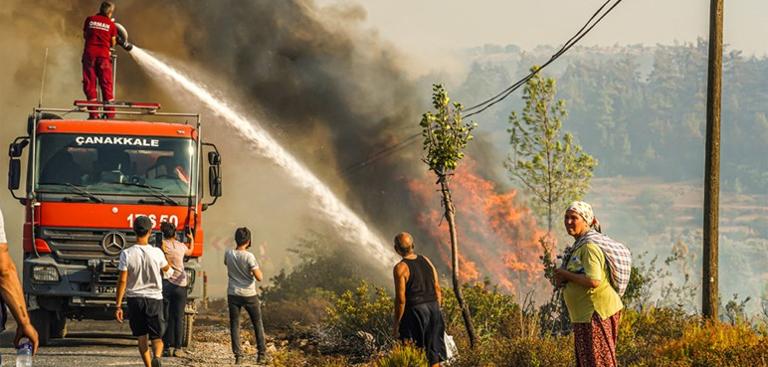The escalating climate crisis has increased the frequency of climate hazards, causing substantial death, injury, environmental damage, and economic loss. Despite Disaster Risk Reduction (DRR) efforts, 2023 saw 399 natural disasters, impacting over 93 million people and causing $202 billion in damages. AI offers enhanced DRR solutions, such as Google's Flood Hub and academic research on predictive models for natural disasters. In Pakistan, AI-enabled forest fire management can alleviate forestry department strains and improve resource management. Key enablers include reliable local data, institutional capacity, stakeholder coordination, sustainable financing, and community inclusion.

As the climate crisis continues to escalate, the frequency of climate hazards such as floods, landslides and wildfires is increasing. The result is increased death and injury, environmental damage and economic loss. Disaster risk reduction (DRR) systems aim to reduce disaster risk by better monitoring the risk of hazards, building capacity to detect and respond as quickly as possible, and improving community preparedness.
The frequency of natural disasters is increasing despite these DRR efforts. In 2023 alone, the Emergency Events Database recorded 399 natural disasters, 39 more than the 2003 to 2022 annual average. These events are estimated to have impacted more than 93 million people, resulting in almost 86,500 deaths and over $202 billion in economic damage.
Artificial intelligence (AI) presents an opportunity to improve the effectiveness of traditional DRR systems. Start-ups and Big Tech are offering a range of AI-enabled DRR solutions, which focus on a combination of predicting hazards, detecting disasters as early as possible, and responding to them more effectively. For example, in 2022, Google launched the Flood Hub, a free-to-use global platform which uses AI models to provide flood risk detection seven days in advance. Academic research centres across the globe are also developing AI models capable of predicting natural disasters such as landslides and earthquakes, generating large-scale building damage assessments and providing early warnings for tsunamis, to name a few.
Combatting forest fires with AI in Pakistan
GSMA Mobile for Development recently conducted research exploring the potential of AI for DRR, specifically in forest fire management in Pakistan, a country ranked 5th in the climate risk index globally. AI-enabled forest fire management solutions are proliferating in both high-income countries prone to risk, such as the US, Australia, Italy, Spain and Turkey, and in low and middle-income countries such as Ethiopia and Nepal, though in the latter context, limited resources can hinder their scalability.
Implementing an AI-enabled forest fire management system in Pakistan could relieve the strain on its overstretched forestry departments and enhance their resource management capabilities by mitigating the risk from natural hazards more effectively. AI can help predict the risk of a fire event, or determine the spread and intensity of a forest fire, by leveraging data on key factors that impact forest fire outbreaks, including the type and condition of vegetation in the forest, weather conditions, topography, and human activity. It can also improve the efficiency of forest fire detection using remote AI-powered vision analysis.
Key enablers for deploying AI-enabled forest fire management systems
An AI-forest fire management system is predicated on five key enablers. At the core of the system is reliable, localised data on the factors that cause forest fires. In addition, well-functioning systems require sufficient institutional capacity, stakeholder coordination, sustainable financing and community inclusion.
Sources:
GSMA
Provided by the IKCEST Disaster Risk Reduction Knowledge Service System
Comment list ( 0 )
